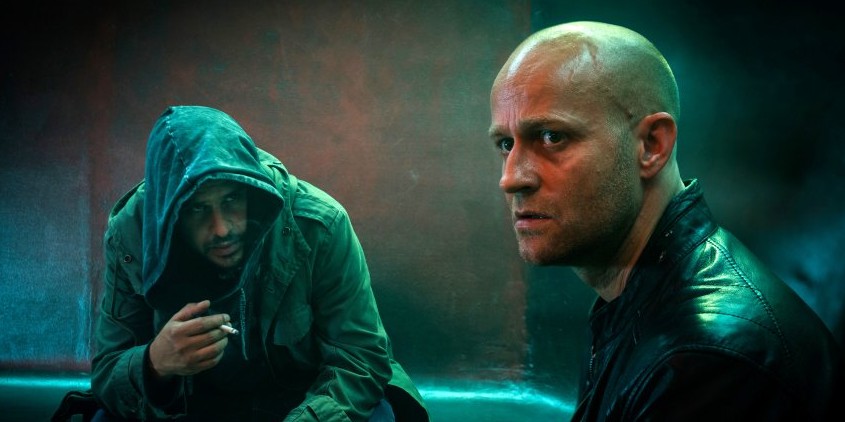In Stereo, Jürgen Vogel’s Eric lives a simple life, his days revolving around repairing bikes, wooing his single-mother girlfriend Julia (Petra Schmidt-Schaller) and playing dad to her adorable daughter, Helena (Helene Schönfelder). Also, Eric sees things. Namely, a hooded figure whose shrouded face is the epitome of ominous mystery. Eric sees the man atop a caravan driving past his motorcycle garage, he sees him following at a distance on an abandoned road. He sees him from his girlfriend’s kitchen window in a wheat field.
We’re quickly introduced to the veiled character, Henry (Moritz Bleibtreu), in the first in a series of unexpected plot developments that keep the suspense amped in Stereo. Germans don’t really do genre film well, often descending into kitsch, but in writer/director Maximilian Erlenwein’s sophomore work, the tightrope between dark humour and believable thriller is balanced upon with care. It helps to have two of Germany’s biggest actors playing off one another; Vogel’s troubled yet wilful Eric is toyed with masterfully by Bleibtreu’s snide, devious Henry.
But are they two real entities or a constructed world in Eric’s unravelling mind? To Eric, Henry is a hallucination, a man he’s never seen before, who voices his most primal urges, hinting at a violent past that Eric either doesn’t recall or consciously refuses to acknowledge. He seeks to be rid of Henry, at first visiting the local hospital, then with treatment from a faith healer with a penchant for acupuncture. Again we witness Vogel and Bleibtreu’s taut chemistry; as Eric nears a cure, Henry shrinks within himself, but somehow his magnetic charisma is never obscured.
Vogel and Bleibtreu’s relationship is borderline buddy-comedy material; a scene wherein Eric and Helena play in the living room and talk of their ‘imaginary’ friends is both discomforting and laugh-out-loud funny thanks to Bleibtreu, slumped on the couch, throwing out inane one-liners that only he and Eric can hear. He may be joking, but he never loses that indecipherable, threatening edge.
In the earlier moments where Eric is uncomfortable with his newfound shadow, we endure the claustrophobic dark confines of the garage as he trades insults with Henry. Then a door is opened and the sunlight slices through like a literal and metaphorical illumination. In this sense the cinematography is sharp, using idyllic countryside scenery to counterbalance the inherent darkness of the lead’s mental state.
Throughout the first half of the film, the characters develop with a gentle hand, Erlenwein coaxing out details that we can choose to pick up or leave behind as red herrings. The second half loses most of this subtlety in a bid to bring about a brutal, inherently gory end. If anything, the premise is set up with a psychological tilt before it reveals itself differently in a remarkable array of plot twists. The goodwill built in pathos-laden scenes such as those between Eric, Helena and Julia is somewhat lost in the need to wrap up the story with a climax typical of the thriller-revenge genre.
Stereo looks and feels slick. The electronica soundtrack, the crisp colours on-screen – especially in the underground club finale (because of course there’s an underground club scene, come on, it’s an action film set in Germany) – is eerily reminiscent of 2013’s John Wick, another film that played unashamedly to the tropes of its genre. Erlenwein’s script stumbles in the last leg partly due to its dedication to stick with audience expectations of an ending that’s bombastically complex, if only to reward our sympathy towards Eric’s makeshift family. At times the dialogue falls into similarly predictable terrain, but it’s unlikely one is coming into this film looking for poetic verbosity.
Thanks to Vogel and Bleibtreu, Stereo has the star power to be a German blockbuster, but in its intricate mind-mazing first act complete with intense character performances, it works better as an example of niche genre cinema.

